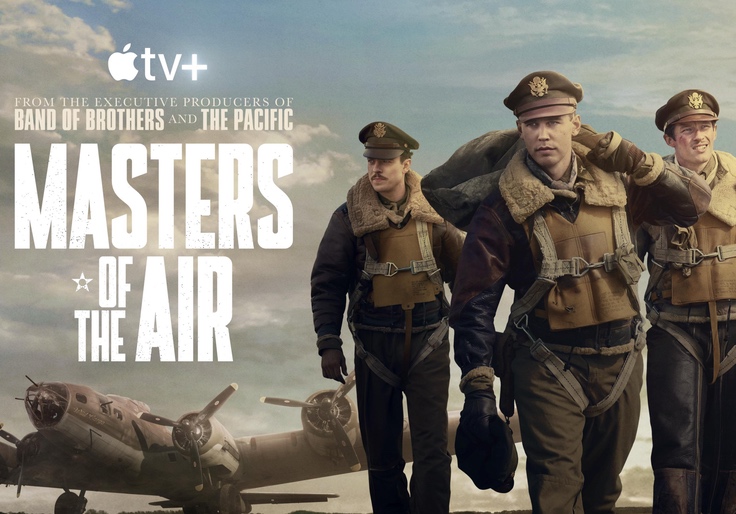Steven Spielberg, Tom Hanks, and Gary Goetzman—the producers of HBO's Band of Brothers and its partner The Pacific—have joined forces with Apple TV+ to bring audiences Masters of the Air, a miniseries that follows the heroic actions of the 100th Bomb Group, a B-17 Flying Fortress heavy bomber unit in the Eighth Air Force, during World War II.
In a similar fashion to its predecessors, Masters of the Air weaves together multiple storylines, combining conflict and violence during bombing raids over German-occupied Europe with the personal struggles and experiences of numerous key characters, including best-friend pilots Major Gale "Buck" Cleven and Major John "Bucky" Egan (played by Austin Butler and Callum Turner), navigator Lieutenant Harry Crosby (portrayed by Anthony Boyle), and Major Marvin "Red" Bowman, played by Stephen Campbell Moore.
But the meat of Masters of the Air is the visually stunning and yet horrifying re-creations of multiple air-based attacks on German positions, with our modern concept of calm and reliable flight shattered into a field of smoke, fire, and red-hot metal as American B-17s navigate seemingly impenetrable fields of flak, bullets, rockets, and what feels like a never-ending supply of Luftwaffe fighters.
These scenes are so well produced that they would suffice as standalone insights into the reality of war. Audiences can't help but share in the combined stress, fear, and mourning throughout each and every mission. This is especially jarring when we consider the sheer number of dangers each crew must escape to survive (let alone succeed in their mission), including what have now become mundane matters of maintenance and navigation.
And there are multiple other fascinating threads within the miniseries, including the efforts made by European allies to help downed pilots evade German capture, the internal politics of heavy bomber units regarding a minimum number of missions flown, and the constant work performed by on-the-ground teams to keep what can only be described as a group of glorified tin cans airborne.
In the context of conflict alone, this miniseries hammers home not only the human cost of these missions, but the somehow unbelievable fact that anyone managed to survive to tell the tale.
But when Masters of the Air attempts to go beyond military re-creation, it unfortunately falls short. Perhaps its biggest weakness is the fact that its predecessor—Band of Brothers—is one of the most iconic television series of all time, providing a truly ground-breaking insight into the history of "Easy" Company and the 101st Airborne Division. Across 10 episodes, through character development and production mastery, audiences couldn't help but forge relationships with every member of the cast. Band of Brothers set the bar so high, even a B-17 couldn't surpass it.
And while it's obviously unfair—and disrespectful—to compare the military history of each miniseries in the context of television entertainment, when it comes to the vein of drama inserted as a supplement, Masters of the Air fails in three aspects.
The first is that, by nature of airborne conflict, it's difficult for the audience to build an attachment to any character when it becomes impossible to tell them apart through a sea of goggles and masks thousands of feet in the air. While the loss of any character in Band of Brothers was devastating, the anonymity of airborne characters in Masters of the Air makes it difficult to truly process the human loss suffered over the skies of Western Europe.
The second failure is that the grittiness of Band of Brothers, The Pacific, and Saving Private Ryan has been, at times, replaced by a Hollywood-esque sheen that makes Masters of the Air feel out of place with its counterparts. The suffering and sacrifice of paratroopers and Marines were etched into the physical performances of every character in Band of Brothers and The Pacific. The perfectly groomed Austin Butler with his gleaming veneers—not so much.
The third failure is the rushed (and sometimes nonexistent) character development. In Band of Brothers, characters and their friendships develop over time, from training in the United States, to the United Kingdom, to Normandy, Holland, and Germany. The only pre-built friendship is between Major Richard "Dick" Winters and Captain Lewis Nixon (played by Damian Lewis and Ron Livingston). But this friendship appears in the sidelines as we follow the progression of the war. Meanwhile, the friendship of Butler's "Buck" and Turner's "Bucky" is central to Masters of the Air, making it feel pre-packaged and, frankly, shallow.
Overall, the attempt to dramatize history also feels overblown at times. Seemingly random arguments between Brits and Americans are inserted to create additional and completely unnecessary tension, the yearslong suffering of British civilians under German raids is practically ignored compared with the impact of Allied bombing assaults on German cities, and several missions are cut short so that we can focus on random sexual encounters or on-base drinking games.
Collectively, these only serve to somehow dilute what could otherwise be an unnerving and overwhelming chapter of World War II history.
Even if we set the layer of Hollywood glamor and unnecessary subplots aside, however, the stunning battle scenes deserve nothing but praise. Like Band of Brothers and The Pacific, Masters of the Air should leave audiences in awe of the greatest generation who did unimaginable things in defense of the world we now take for granted.
Masters of the Air is currently streaming on Apple TV+.
Ian Haworth is a writer, speaker, and former Big Tech insider. He also hosts "Off Limits with Ian Haworth."
